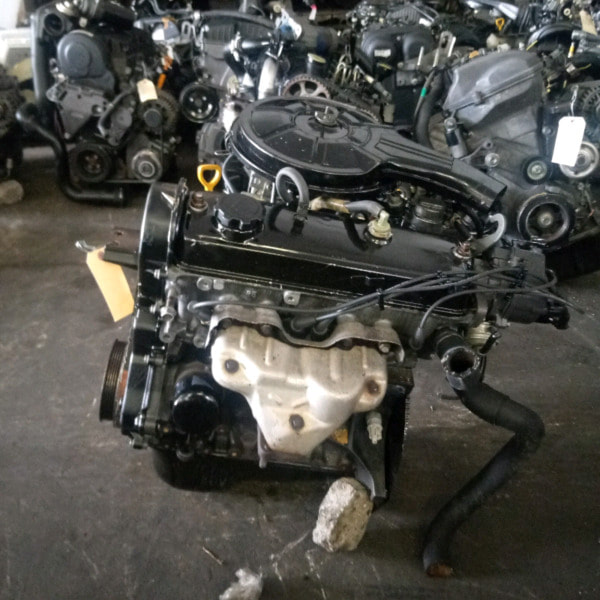Drive with Confidence: Toyota Tazz Engine for Sale, Genuine Components Only
Drive with Confidence: Toyota Tazz Engine for Sale, Genuine Components Only
Blog Article
Engine Buying Professional Tips on Selecting the Right Engine for Your Particular Needs
Choosing the ideal engine for your specific needs includes an intricate interaction of factors that go past mere horse power figures. By delving into the details of power versus performance, evaluating fuel ratings, and budgeting for long-term prices, one can truly maximize their engine selection.
Power Vs. Effectiveness: Discovering the Equilibrium

When selecting an engine, it is essential to strike an equilibrium between power and efficiency to satisfy your specific requirements successfully. Power refers to the engine's capability to create power for propulsion, establishing variables like acceleration, hauling ability, and total efficiency (Toyota Tazz Engine For Sale). On the various other hand, performance associates to how well the engine utilizes fuel to produce power, affecting elements such as fuel economy and environmental kindness
Achieving the best balance between power and efficiency is essential since an engine that is as well effective might consume excessive fuel, leading to greater operating expenses and unnecessary pressure on the setting. Alternatively, an engine that prioritizes performance over power might lead to slow-moving efficiency, specifically popular situations like hauling heavy loads or driving uphill.
To make an informed choice, take into consideration variables such as your common driving problems, the desired usage of the lorry, and your personal preferences. By examining your needs and concerns, you can pick an engine that strikes the best balance in between power and performance, making certain optimal efficiency while minimizing ecological impact and operating expense.
Understanding Engine Dimension and Type

Furthermore, engine type plays a crucial role in figuring out the performance characteristics of an engine. Typical engine kinds include inline engines, V engines, and rotating engines, each with its one-of-a-kind advantages and drawbacks. The engine type impacts elements such as the engine's dimension, weight circulation, and power delivery. Comprehending the interaction in between engine dimension and type is crucial in selecting an engine that straightens with your details requirements and priorities, whether it be power, performance, or a balance of both.
Consider Your Vehicle's Requirements
If you are looking for an engine for a heavy-duty vehicle that will certainly be made use of for towing, you will certainly require an effective engine with high torque abilities. On the various other hand, if you are picking an engine for a small vehicle mostly used for city commuting, fuel effectiveness may be a much more essential factor to consider.

Examining Gas Efficiency Scores
Examining gas performance ratings is a vital element of choosing the appropriate engine for your automobile, making certain expense financial savings and ecological sustainability. Gas effectiveness ratings, commonly determined in miles per gallon (MPG) for gasoline engines or kilowatt-hours per 100 miles (kWh/100 miles) for electrical engines, indicate exactly how much an automobile can take a trip on continue reading this a particular amount of fuel or electricity. Greater MPG or lower kWh/100 miles values indicate a lot more reliable engines, converting to lowered fuel expenses and lower carbon exhausts.
When examining gas effectiveness rankings, consider your driving needs and practices. A very fuel-efficient engine can result in significant financial savings over time if you commute long distances daily. Additionally, compare different engine choices within the very same vehicle class to recognize the most economical selection. Factors such as engine dimension, weight, aerodynamics, and crossbreed or electrical capabilities can all affect fuel effectiveness.
Budgeting for Long-Term Prices
Strategically preparing for lasting expenses is vital when selecting an engine, making sure financial sustainability over the car's life expectancy. While the preliminary acquisition price of an engine is a considerable element, it is critical to consider the long-term expenses related to maintenance, repairs, and fuel usage. Selecting a much more fuel-efficient engine might have a higher upfront cost yet can lead to significant financial savings with time. Regular maintenance, such as oil changes, filter replacements, and tune-ups, is necessary to maintain the engine running smoothly and successfully, reducing the risk of expensive fixings down the line.
In addition, looking into the availability and website here cost of substitute components for the picked engine is essential in spending plan planning. By carefully budgeting for these long-term costs and factoring them right into the decision-making process, people can select an engine that not just fulfills their immediate requirements but additionally continues to be cost-effective throughout its life-span.
Verdict
To conclude, choosing the ideal engine for your particular needs requires balancing power and efficiency, understanding engine size and kind, considering your car's requirements, examining fuel performance ratings, and budgeting for long-lasting expenses. By very carefully considering these variables, you can guarantee that you pick an engine that fulfills your needs and gives optimal efficiency for your vehicle.
To even more refine the choice process of an engine that strikes the ideal balance between power and performance, it is important to delve right into the ins and outs of understanding engine dimension and type. Engine size refers to the overall quantity of his comment is here air and gas that can be pushed via the engine cylinders. Usual engine types include inline engines, V engines, and rotary engines, each with its distinct benefits and drawbacks. Understanding the interaction between engine dimension and type is essential in picking an engine that aligns with your specific demands and top priorities, whether it be power, effectiveness, or a balance of both.
Gas effectiveness rankings, typically determined in miles per gallon (MPG) for fuel engines or kilowatt-hours per 100 miles (kWh/100 miles) for electric engines, suggest how much a lorry can take a trip on a details amount of gas or power.
Report this page